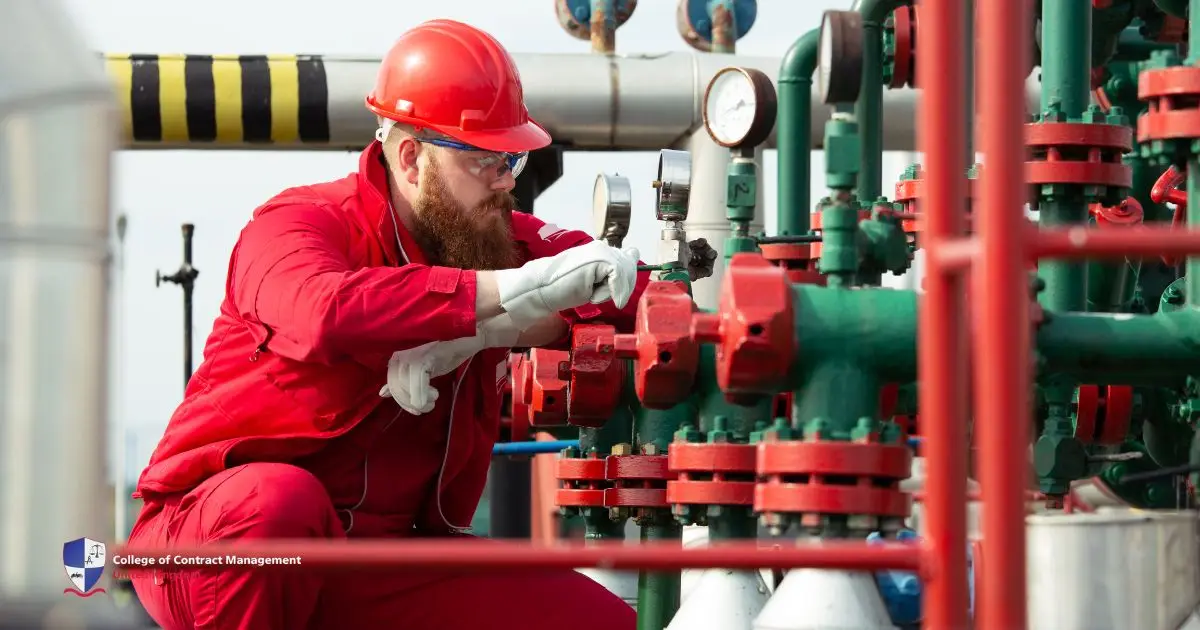Becoming a gas engineer in the UK is a great career choice for those looking for a well-paid, skilled profession with plenty of opportunities for growth. It's a field that mainly work with gas systems and appliances, ensuring they are safely installed, maintained, and repaired. And because of this, such professionals are in high demand, from residential homes to commercial businesses.
If you are tempted by thought of working in the industry, you need to make sure you have the appropriate skills. This career path is most beneficial to those with the right skills and training. We at the College of Contract Management understand the importance of levelling up your career through enhaced capabilities. With that in mind, here's everything you need to know about starting or advancing your career in gas engineering.
What is a Gas Engineer?
Gas Engineers are professionals who specialises in working with any type of appliances and systems that involve the use of natural gas and hydrocarbons. Gas Engineering is an essential line of work. They ensure that homes and businesses are safe and warm by following strict safety regulations. They are responsible for ensuring that the gas appliances that people are using work efficiently, preventing dangerous issues caused by leaks and carbon monoxide buildup.
Since gas engineers mostly deal with safety, they must be Gas Safe registered. This means that engineers in this line of work are trained handle gas systems according to the safety standards. The Gas Safe Registry is the UK's official body that ensures that gas engineers are certified and qualifieed to work on different gas systems.
What a Gas Engineer does:
Their line of work consists of repairing, installing, and servicing these appliances and systems. So, as a gas engineer, their responsibility extends to working in industrial, commercial, and, of course, residential settings. Another part of their daily task is that they perform safety checks. These tests include testing faulty systems and gas leaks. They also involve themselves with teaching clients different ways to make sure that they use gas safely and efficiently.
Whether working in businesses or homes, gas engineers must combine their technical skills and safety knowledge. With this in mind, it shows that their work is essential not just for comfort but also for a structure's overall safety.
How to become a Gas Engineer?
If you decide to become a gas engineer, expect a rewarding career ahead of you that will make a difference in people’s lives. In this line of work, you’ll gain technical and safety skills that will help you enjoy a variety of job opportunities. So here’s a step-by-step guide to become one.
Step 1: Obtain the right qualifications
To work as a gas engineer in the UK, you’ll need formal qualifications. This usually starts with a Gas Safe Register-approved course. These courses equip you with the skills and knowledge to safely handle gas. Look for a course that offers both theory and practical training, as hands-on experience is crucial.
Many aspiring gas engineers take the following routes:
- Apprenticeships: This is one of the most popular paths, offering a blend of on-the-job training and classroom learning. Apprenticeships typically take two to four years and lead to an NVQ or diploma in gas installation or maintenance.
- College Courses: Another option is enrolling in a college-based gas engineering course. These courses offer a faster route to qualification but often require some form of work placement for practical experience.
Step 2: Get hands-on experience
Theory is essential, but real-world experience is what sets a good gas engineer apart. Most gas engineering courses include practical work placements. During these placements, you’ll work alongside experienced engineers, learning how to handle various gas systems and appliances.
If you choose an apprenticeship, you'll gain this hands-on experience as part of your job. In a typical apprenticeship, you’ll spend most of your time working in the field, with regular classroom sessions to solidify your knowledge. If you go the college route, try to find a work placement or internship that lets you practise your skills in a real-world setting.
Step 3: Register with the Gas Safe Register
In the UK, it's illegal to work as a gas engineer without being registered with the Gas Safe Register. This is the official body that oversees gas safety in the country. Firstly, to get registered, you’ll need to prove that you have the necessary qualifications and experience.
The registration process includes an assessment of your skills to ensure you can work safely and competently with gas systems. Lastly, once registered, you’ll be issued a unique license number, which you’ll need to renew annually.
Step 4: Specialise in a specific field (Optional)
While many gas engineers choose to work in general gas systems and appliances, you may decide to specialise in a particular area. For example, you could focus on:
- Commercial Gas Engineering: Working in larger buildings or industrial settings.
- Boiler Installation and Maintenance: Specialising in boilers, a common area of focus for many gas engineers.
- Smart Metre Installation: With the rise of energy-efficient smart metres, this is a growing area of demand.
Specialising can set you apart from other gas engineers and may open up higher-paying job opportunities.
Step 5: Build a strong professional reputation
Once you obtain the necessary qualifications and experience and register with the Gas Safe Register, it's time to establish your professional reputation. Whether you work for a company or as a self-employed gas engineer, your reputation is crucial for success in this field.
Here are a few tips for building a solid reputation:
- Customer Service: Providing excellent customer service is key to gaining repeat business and referrals.
- Attention to Detail: Always double-check your work to ensure everything is safe and up to standard. Safety is the number one priority in gas engineering. You can do this by taking Construction Risk Management courses.
- Continuous Learning: Technology and safety standards change over time, so it’s important to stay up to date with the latest developments in gas engineering.
Step 6: Consider self-employment or starting your own business
After gaining experience, many gas engineers become self-employed or start their own gas engineering business. For this reason, this path gives you more freedom and a chance to make more money, but it also means you have to handle your business, find clients, and follow all the rules. If you go this way, be sure to have a good business plan. So, taking some extra classes in business or marketing could also really help.
Step 7: Take related Construction courses
Gas engineering is closely related to other construction fields. Many gas engineers learn more skills through construction courses. Additionally, this helps them get better jobs or do more within the construction field.
- Plumbing Courses: Many gas engineers begin their careers in plumbing. Learning plumbing skills can be a valuable asset, as the two trades often overlap. For example, installing a central heating system requires both plumbing and gas engineering knowledge.
- Heating, Ventilation, and Air Conditioning (HVAC) Courses: HVAC systems frequently integrate with gas appliances, and having expertise in this area can make you a more versatile engineer.
- Construction Management: If you’re looking to move into supervisory or management roles, a qualification in Construction Management can be beneficial. This course covers project management, budgeting, and leadership skills, all of which can help you advance in your career.
By adding related courses to your gas engineering skills, you become more attractive to employers and find new chances in construction.
Career prospects and salary as a Gas Engineer
The demand for qualified gas engineers in the UK is high, meaning career prospects are strong. So, as a newly qualified gas engineer, you can expect to earn between £25,000 and £35,000 per year. As your experience grows, you can expect your salary to reach between £40,000 and £50,000 a year. If you specialise or run your own business, you could earn more. Additionally, there are also lots of chances to move up in the industry. So, you could end up leading teams or working with renewable energy, like air source heat pumps or solar panels, which are getting more popular in the UK. Here’s more benefits that you can get if you ever decide to become a gas engineer.
- High Demand: Gas engineers are very in demand in the engineering industry. For this reason you can expect to have a secure and steady work.
- Career Growth: As a gas engineer you can have a variety of options to specialise in different areas like HVAC and renewable energy.
- Flexibility: In this profession you have the option to work in a variety of companies. As well as the option to be self-employed, giving you control over your schedule.
Join us!
Becoming a gas engineer in the UK can lead to a fulfilling and secure career. The College of Contract Management offers a range of courses that can support you at every stage of your career, whether you're just starting out or looking to enhance your skills.
Boost your skills with online courses from the College of Contract Management. Perfect for becoming a top gas engineer. Start building your future with us today!





